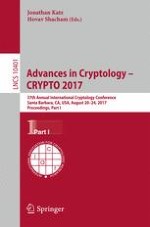2017 | OriginalPaper | Chapter
A New Approach to Round-Optimal Secure Multiparty Computation
Authors : Prabhanjan Ananth, Arka Rai Choudhuri, Abhishek Jain
Published in: Advances in Cryptology – CRYPTO 2017
Publisher: Springer International Publishing
Activate our intelligent search to find suitable subject content or patents.
Select sections of text to find matching patents with Artificial Intelligence. powered by
Select sections of text to find additional relevant content using AI-assisted search. powered by
Abstract
-
A five round MPC protocol based on the Decisional Diffie-Hellman (DDH) assumption.
-
A four round MPC protocol based on one-way permutations and sub-exponentially secure DDH. This result is optimal in the number of rounds.
